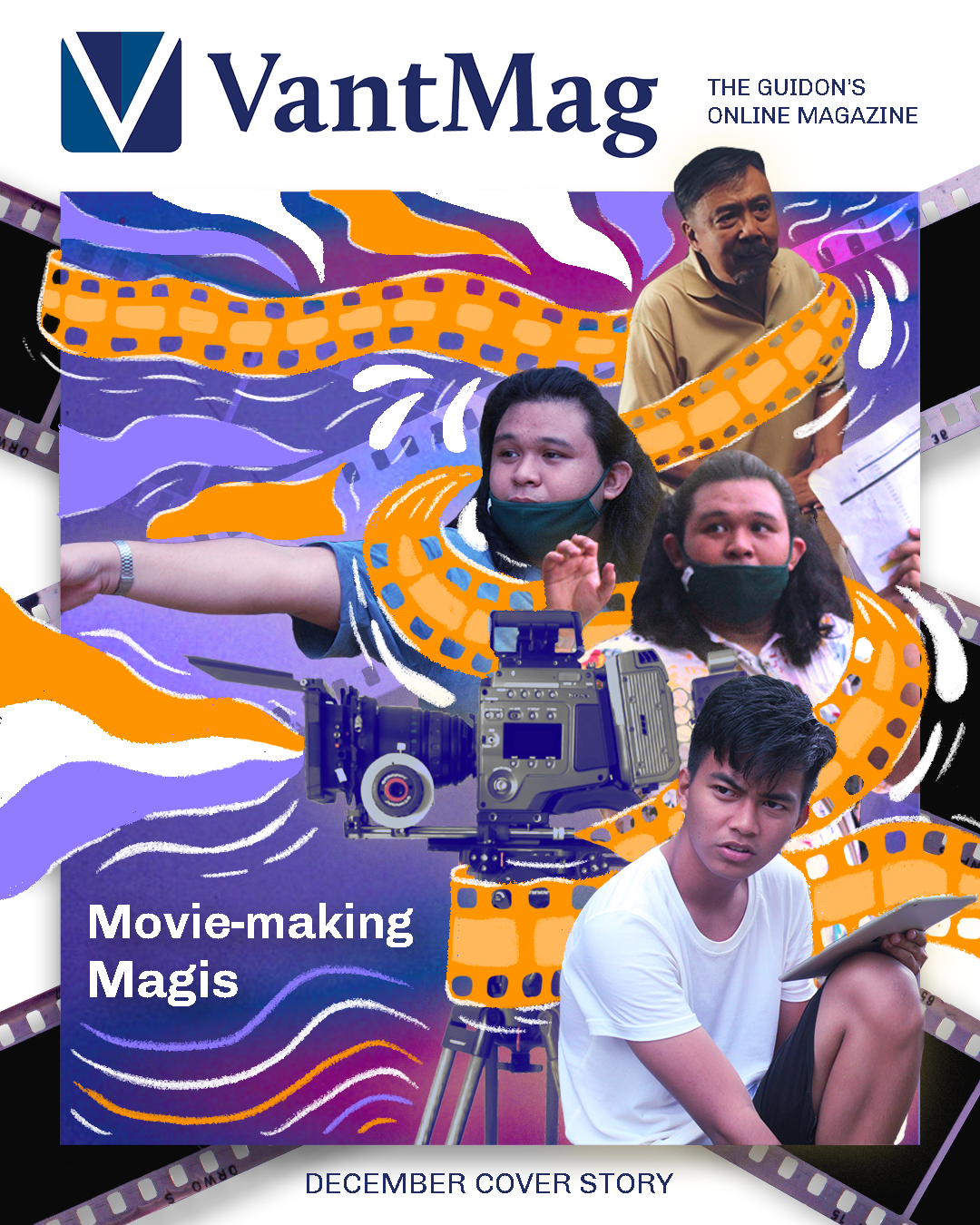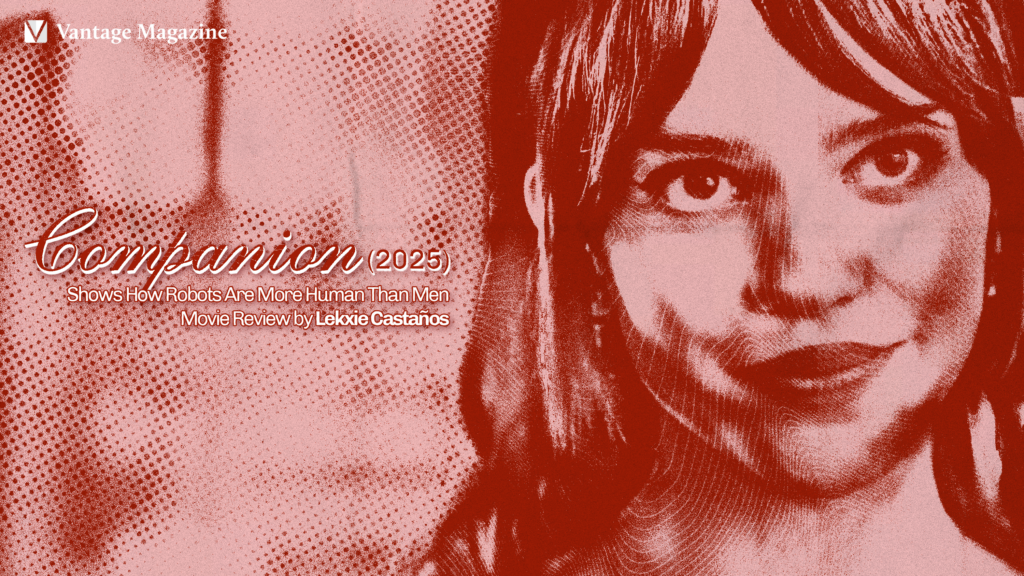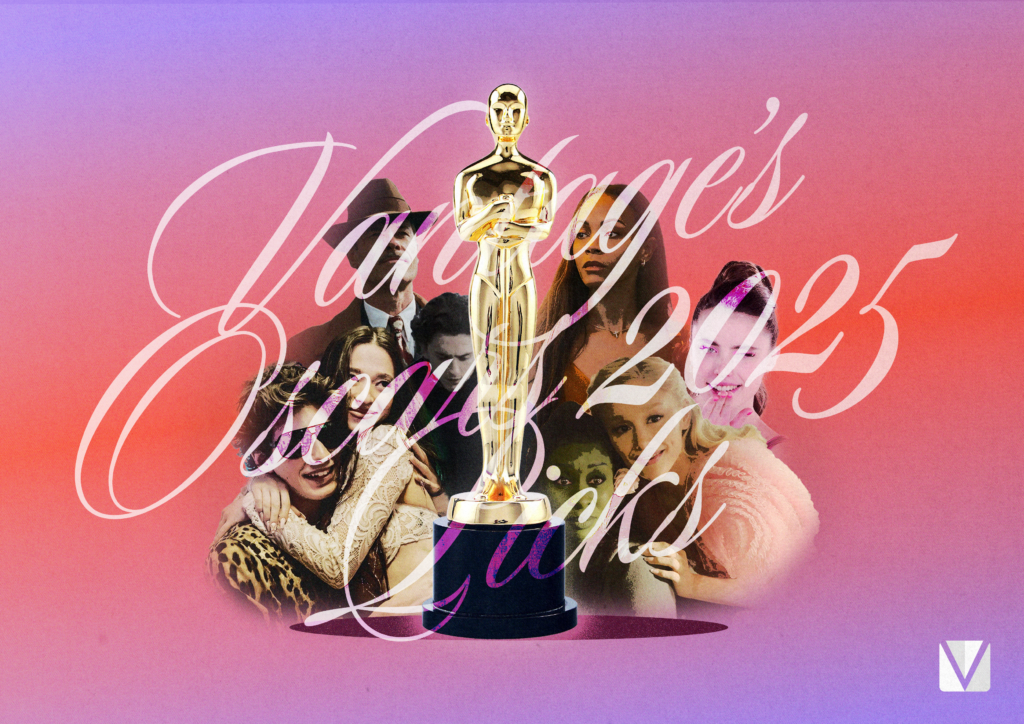CIRCUMSTANCES LIKE the pandemic have pushed Atenean filmmakers to become even more creative with their projects. They have since been presented with the task to reevaluate the conventional practices of their productions while quarantine restrictions are still being implemented across the country. These setbacks are especially crucial to consider when producing their works—even as the University slowly moves back to on-site classes within a reimagined normal.
For this month’s cover story, Vantage spoke with three student filmmakers who have since adapted their work to the online setting. As they relay their insights and experiences, they’re here to show exactly how steadfast and tenacious their art can be in times as trying as these.
Lights, camera, … hello?
As soon as the tapes start rolling, the crew is focused and the actors are fully-immersed in their roles. But what happens when a pandemic hits and production suddenly halts? COVID-19 came so unexpectedly, leaving sets abandoned, scripts unread, and directors without the chance to even scream “Cut!”
Fortunately, student filmmakers Vanessa Leonardo (3 AB COM) and Lance Biene (3 AB COM) were lucky enough to finish their film Ang Pintor for the Loyola Film Circle (LFC)’s Isapelikula right before the world closed down. Biene, one of the scriptwriters and the editor for the project, shared that they were still able to film in January and screen the final work by March of 2020. Even fellow filmmaker Jake Consing (4 AB COM) also had his own projects like Ang Sabi ng Anghel to work on, which he managed to release just before the lockdown began.
However, filmmaking soon became a far-flung fantasy during the peak of lockdowns and quarantines. While others held on to the hope that COVID-19 was going to blow over in a few months, Biene saw that this wouldn’t be the case.
“Once I arrived home, I immediately knew that every possible project that I could have developed—that I could have made—is going to be canceled,” he explains. “I had to accept that, because you can’t do anything about this situation.”
While the uncertainty of the situation put everyone’s plans in a state of limbo, it wasn’t long before the urge to create eventually broke through. Being stuck at home and bored out of one’s mind was all it took to get inspired again.
“There was just such a rush of creativity for me.” Biene says of the time he spent during lockdown back at home. “By the end of 2020, I had story ideas to develop, 26 of them—all from various new things that I saw on social media.”
For Leonardo, the lack of real-life social interaction allowed her to sit with her thoughts and gain awareness of the happenings in the world. Ironically, she shares, “I felt like I got more connected with other people during the pandemic… It helps getting different perspectives.”
Consing mentions that he definitely ran into a few artistic and logistical challenges, but these ultimately prompted him to push the boundaries of his craft. “In fact,” he says, “Restrictions always—maybe not always—but restrictions [can] breed good art.”
He adds that he looked to the Martial Law era as an analogy for how facing limitations like the pandemic doesn’t make producing a good film impossible. “The second Golden Age of Philippine cinema was during Martial Law. We had Lino Brocka, Ishmael Bernal, Mario O’Hara, Peque Gallaga [making] such excellent, amazing films that were critical of the government in subversive ways and some of the best films in Philippine cinema,” he explains.
Additionally, Consing notes that the pandemic created more moral and financial challenges, such as securing the necessary accommodations for everyone on set along with ensuring their safety. “We have a lot to think about, and there’s a big burden on your shoulders as a director or producer because if someone gets COVID on your set, that’s on you or at least a part of it is on you,” he warns.
Still, Leonardo shares that she would much rather have on-site productions even though online productions may be less tiring and require less physical effort. “There’s just a different energy when you’re conversing with the crew members, with your partners, with people who are going to help you in production,” Biene confesses.
“Apart from making a film, you get to build relationships and connections,” Leonardo notes as she recognizes the missing aspect of collaboration and teamwork. Even Consing emphasizes just how much he loves the experience of being on set, and how different it is from working on an online production.
From being set back to being back on set
It goes without saying that producing films as a student filmmaker during the pandemic isn’t without its setbacks. To cope with creative and logistical challenges, Leonardo emphasizes the importance of actively reaching out to her entire cast and crew and maintaining clear lines of communication. On top of that, she also mentions how imperative it is to work with people with the same vision and goals.
Another challenge met during filming in a pandemic is casting. This process isn’t as easy as it used to be, with the need for Reverse Transcription Polymerase Chain Reaction (RT-PCR) tests, accommodations, personal protective equipment, and vaccinations, among the other considerations.
This is why Consing comments that budget is a big factor in shooting on-site, with much of it going to safety protocols. For instance, longer shoots will require the cast and crew to “lock-in,” which means that accommodations have to be made for everyone.
To minimize costs, there’s also the option of casting family—the people closest to you. “Most of the people involved in both films [I produced during the pandemic] were literally just my cousins, my titas and titos, and some of their friends,” Biene shares about shooting in his hometown.
These challenges with casting have also necessitated compromises in the screenplay. Leonardo talks about a script that was originally written for four main characters but had to be cut down to three. She shares that, in the end, it worked out for the best because it made the narrative more concise and helped lessen exposure.
Besides rewriting screenplays, the filmmakers also had to compromise by recreating locations with limited space and a limited budget. Leonardo shares that she’s had to manipulate different places in her house to cater to the films she produced. Meanwhile, a warehouse was almost turned into a classroom for one of Biene’s productions.
Despite all of these challenges, these Atenean creatives continue to produce films that capture how they make sense of their lived realities. Leonardo believes that student filmmaking is something that should be valued and continued.
“[W]hat’s nice about student filmmaking is they do the stories they want to tell just because they want to tell it. They don’t have to think about the market; they don’t have to think about publicity or [the film] being marketable.”
She adds that students have a unique perspective and commentary on sociopolitical themes because of this and hopes that the filmmaking industry can be more accessible to student filmmakers.
When it comes to the creative aspect of filmmaking, the pandemic was able to spur many new narratives for these storytellers. Leonardo says that being sensitive to the state of the country has shifted the direction of her storytelling. There are many stories that need to be told, and there’s a greater urgency to tell them during this time.As the ongoing COVID-19 pandemic continues to challenge creativity in the film industry, these filmmakers have ultimately managed to take on these circumstances as new opportunities to elevate the inner workings of their craft. Film has always been about the stories that we yearn to tell. The youth may as well be one of the groups at the forefront of offering such a diverse set of narratives in this current socio-political landscape. For these filmmakers, the best exercise of Magis is by choosing the more loving option for themselves, the people they work with, and the people whose lives are touched by their art.






